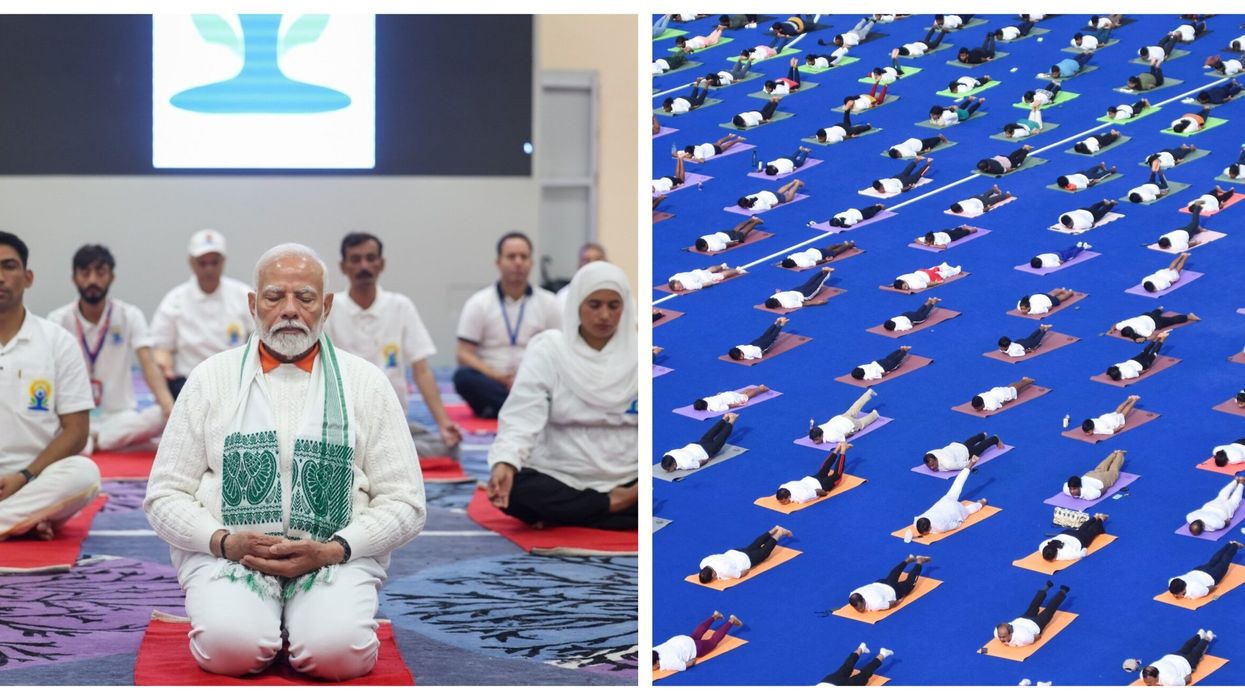Thousands of yoga enthusiasts worldwide gathered to celebrate the 10th International Day of Yoga on Friday. Recognising its universal appeal, the UN proclaimed 21 June as the International Day of Yoga in December 2014, following a proposal by India endorsed by 175 member states.
Indian prime minister Narendra Modi highlighted yoga's global significance while leading a session at the Sher-i-Kashmir International Convention Centre in Srinagar, Jammu and Kashmir. He emphasised yoga's role in personal development and its potential to boost tourism in Jammu and Kashmir. Despite early morning rain, Modi performed various asanas with students and encouraged selfies. He tweeted, "Post Yoga selfies in Srinagar! Unparalleled vibrancy here, at the Dal Lake," and posted pictures of himself taking selfies with students.
Modi noted the growing popularity of yoga, citing its integration into daily life worldwide, including countries like Turkmenistan, Saudi Arabia, Mongolia, and Germany. He mentioned the 101-year-old Frenchwoman Charlotte Chopin, awarded a Padma Shri for popularising yoga in France, and noted the rise of yoga tourism in Indian states like Uttarakhand and Kerala. "People are now hiring personal yoga trainers for fitness, and companies are including yoga in mind and body fitness programmes for their employees. It has opened new avenues of livelihood," he added.
Modi also focused on the potential impact of yoga on Jammu and Kashmir. "I have been seeing since yesterday that yoga is becoming popular with the people of Srinagar and (rest of) Jammu and Kashmir. It is a big thing that 50,000 to 60,000 people are associated with yoga. This will attract more tourists here," he said. He cited a competition in Egypt where yoga was used to promote tourism, suggesting that Kashmir could benefit similarly.
In New York, the Consulate General of India and the Times Square Alliance hosted special sessions at Times Square. Despite heat advisories and temperatures reaching 33.8 degrees Celsius, people from all backgrounds arrived early Thursday morning for yoga and meditation sessions led by Richa Dhekne, a seasoned instructor from the Art of Living Foundation. Several other yoga teachers and experts led various meditation, exercises, and breathing sessions throughout the day at Times Square.
In Washington, hundreds of enthusiasts observed the day at the picturesque Wharf, overlooking the Potomac River, with India’s deputy ambassador to the US, Sripriya Ranganathan. The yoga session began with prayers and Indian classical dance performances, highlighting the spirit of oneness and harmony inspired by the ancient practice.
In Tel Aviv, over 300 people participated in sessions at the Peres Centre for Peace and Innovation, where Israel's First Lady Michal Herzog highlighted the deep friendship between India and Israel. The event was organised by the Embassy of India in Israel in association with the Tel Aviv-Yafo Municipality and the Ministry of Culture and Sports of Israel.
In Singapore, minister of state for Health Rahayu Mahzam joined more than 200 enthusiasts and the Indian High Commissioner Shilpak Ambule in celebrating the day. The minister emphasised in her keynote speech the importance of yoga in fostering a healthy and balanced lifestyle. “India has certainly played a leading role in promoting the benefits of yoga to the world. The flexible and adaptable nature of yoga also makes it inclusive for people of different ages, genders, and physical abilities. I am glad to see participants from all walks of life in today’s event,” she said.
In Nepal, the Indian Embassy organised yoga demonstrations at three iconic landmarks of Pokhara, the tourism capital of the country, as well as in Lumbini. "What better way to spread the message of #YogaForSelfAndSociety than to assimilate Yoga, Nature, and Spirituality! @IndiaInNepal organised yoga demonstrations at 3 iconic landmarks of #Pokhara, the tourism capital of Nepal," the mission tweeted. The chief minister of Lumbini, Jokh Bahadur Mahara, thanked the organisers for strengthening bilateral ties through the event.
India's Embassy in Sri Lanka also organised several yoga sessions, including in Jaffna and Kandy.
The Indian Embassy in Beijing held a yoga class at Beijing Morning Star School, led by the Embassy’s Cultural Teacher (Yoga) Lokesh Sharma, where more than 45 students practised various poses to improve flexibility and concentration.
In Rome, ambassador Vani Rao spoke about “Yoga for Self and Society” at an event organised by the Italian Hindu Union.
In India, the UK High Commission, US Embassy, and Israeli Embassy were among the diplomatic missions participating in yoga sessions. India's external affairs minister S Jaishankar, joined by his deputies and diplomats, shared photos on social media celebrating the event.
Jaishankar wrote on X, "Developing Yoga enthusiasm and awareness around the world has been an inspiration. Happy to see that #YogaforSelfAndSociety has become an essential way of life for so many."
The UK High Commission in New Delhi shared photographs on X of some of its members performing yoga asanas. "Inhale, exhale. Armed with our yoga mats, team #UKinIndia joined millions of people in India and around the world to celebrate International #YogaDay," the UK High Commission posted.
The US and Israeli embassies shared videos to mark the day. The Israeli Embassy's video featured envoy Naor Gilon and staff sharing their thoughts on yoga. "Namaste! This #InternationalYogaDay, our diplomats share why they LOVE #yoga. They might not be yogis yet, but they sure have fun trying!" the embassy posted on X.
The US Embassy's video featured children trying different yoga asanas. "It's Yoga Day and our adorable little yogis are stealing hearts with their smiles and stretches! Watch as our tiny warriors strike adorable poses, from Virabhadrasana to the Bhujangasana!" the embassy posted.
The celebration underscored the widespread impact of yoga, with Modi stating, "The world is looking at yoga as a powerful agent of global good. Yoga helps us live in the present moment without the baggage of the past. When we are peaceful within, we can also make a positive impact on the world."
(Agencies)





